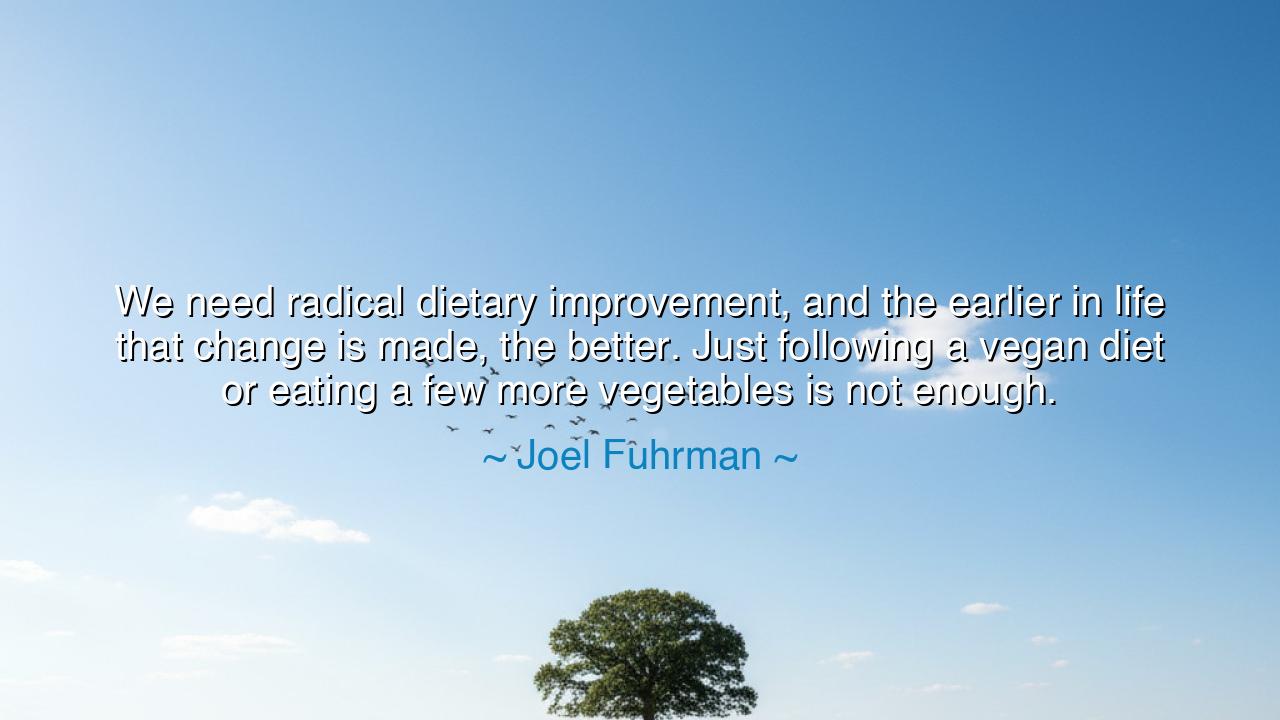
We need radical dietary improvement, and the earlier in life that
We need radical dietary improvement, and the earlier in life that change is made, the better. Just following a vegan diet or eating a few more vegetables is not enough.






In the words of Joel Fuhrman, the healer of our age, there echoes a call both urgent and eternal: “We need radical dietary improvement, and the earlier in life that change is made, the better. Just following a vegan diet or eating a few more vegetables is not enough.” This is not a mere whisper about food; it is a proclamation about life itself — about the sanctity of the body, the vessel of spirit, and the duty of humankind to preserve it with reverence. For in this age of abundance, humanity has fallen into a quiet decay, feasting on what numbs rather than nourishes, choosing convenience over vitality. Fuhrman’s words are not the musings of a scholar, but the warning of a sage who sees that our civilization’s decline begins not in the mind, but in the stomach.
In ancient times, healers were not merchants of medicine but guardians of vitality. They knew that to eat was to pray — that the act of consuming life from the earth was sacred, a covenant between humanity and nature. The Greeks spoke of sōphrosynē, temperance, as the harmony of appetite and wisdom. So too did the Taoists teach that the body is the mirror of the cosmos — when it is impure, the spirit clouds; when it is clean, the spirit shines like the morning sun. Thus, when Fuhrman speaks of radical improvement, he calls us not to a new diet, but to a return — a remembrance of what the ancients already knew: that health is not a pursuit of pleasure, but the practice of balance, discipline, and reverence for the natural order.
Consider the story of Pythagoras, the philosopher who once forbade the eating of flesh. He did not do so merely for compassion toward animals, but for clarity of mind and purity of soul. He taught his disciples that food carries the vibration of life itself, and that to eat wrongly is to cloud one’s inner light. When his followers abandoned gluttony and embraced simplicity — fruits, grains, and greens — their minds sharpened, their tempers softened, and their wisdom deepened. They became seekers of truth rather than prisoners of desire. Herein lies the echo of Fuhrman’s teaching: veganism alone is not virtue, for even a plant-based eater may fall into excess, indulgence, and ignorance. It is not the label that saves, but the intention and knowledge behind every bite.
Fuhrman’s warning pierces the illusions of modern virtue. In an age where health is marketed and morality is measured by diet trends, he reminds us that transformation must be radical — not superficial. To eat a few more vegetables while clinging to processed oils and sugar-laden delicacies is to patch the sails of a sinking ship. The body, that magnificent temple of being, cannot be deceived. It demands purity, wholeness, and the nutrients of life itself — not substitutes, not mimicry, but the true harvest of the earth, unspoiled by the artifice of man.
Yet there is hope, radiant and alive, for those who begin early — for the young are clay, still soft in the hands of wisdom. When a child is taught to love the earth’s foods — to find joy in the sweetness of a berry, the crispness of a leaf, the life in a seed — that child grows not merely in strength, but in awareness. The spirit within them learns harmony, the heart learns gratitude, and the mind learns clarity. In such nourishment, disease loses its grip, and a generation rises that no longer lives to eat, but eats to live deeply. The earlier the awakening, the more powerful its ripple through the years.
In every civilization that has thrived, there existed a reverence for nourishment. The Egyptians honored the fig and the date as symbols of longevity; the Japanese have long practiced hara hachi bu, eating only until the body is satisfied but never full. These are not customs of diet — they are acts of wisdom, born of self-mastery. Fuhrman’s call for “radical improvement” revives this timeless ethos: to awaken from the slumber of consumption, to reclaim dominion over appetite, and to live with the dignity of one who honors the body as the dwelling of the divine.
Let this be the lesson carried forward: to eat consciously is to live consciously. The mouth is the gate of destiny; what enters it shapes not only the flesh, but the mind and soul. Therefore, let every meal be an offering — simple, whole, and alive. Let us study the foods that heal, discard those that harm, and teach our children that true strength does not come from indulgence, but from discipline and wisdom. Begin today, not tomorrow. For each bite can be an act of self-destruction or self-creation — and in that choice lies the measure of a life well lived.






AAdministratorAdministrator
Welcome, honored guests. Please leave a comment, we will respond soon